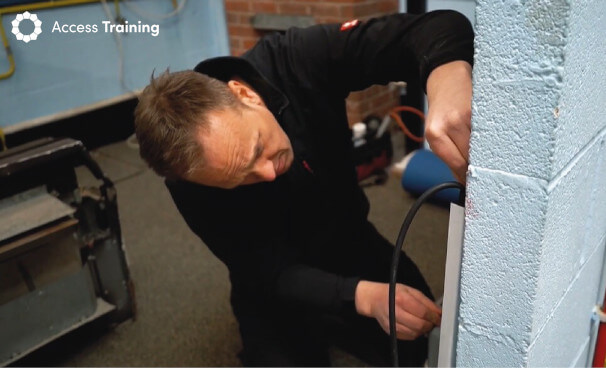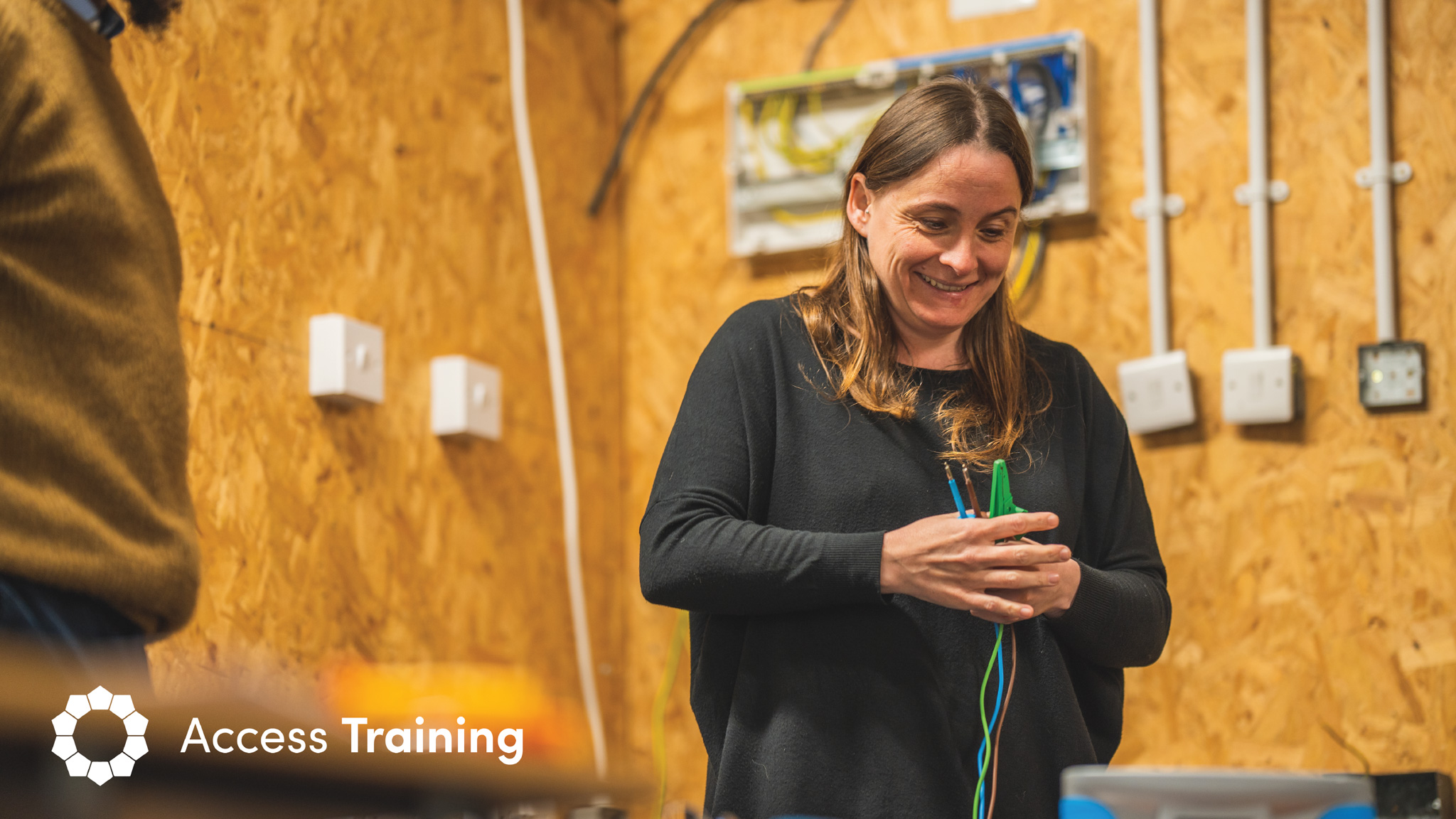
The allure of self-employment is undeniable – choosing your clients, enjoying flexible hours, achieving a better work-life balance, and boosting your earnings potential. If you have the practical expertise and the drive to work independently, launching your own business could be the game-changing career move you've been waiting for. Join the ranks of the growing number of self-employed individuals in the industry and embark on your journey to success.
More...

There are a wide number of reasons people seek to become an electrician – it’s pretty well known that electricians earn lucrative salaries (check out our blog on trade salaries here). Beyond earning a lucrative salary, electricians also have a lot more flexibility than most traditional careers can offer.
Once you have trained as an electrician, the career direction options are endless. Whether you’re looking for employment with a business or are hoping to find success in self-employment, training as an electrician gives you the freedom to choose your path.
If you’re interested in training to become an electrician and are looking for additional information on the qualifications required to become a sparky, keep reading!
Do I need GCSEs to become an electrician?
There are different avenues you can take when it comes to training to be an electrician, such as apprenticeships, college, or training centres. Some facilities will require an applicant to have obtained a number of GCSEs, including maths and English.
Here at Access Training, whether you’ve just finished school or are a mature student looking to train, you can train to become an electrician without GCSEs or equivalent qualifications.
What qualifications DO I need?
To become an electrician, there are some qualifications you’ll need to achieve to prove that you’ve trained and have acquired the necessary skills. Depending on the type of work you’re planning to do, there are different levels of training required.
The basic qualification you’ll need to obtain to prove you have the skills required to practice is a level 3 vocational qualification or diploma.
This qualification is the bare essential you need to be able to practice, and depending on what level of work you’d like to engage in past your training period, there are a number of further qualifications you can achieve.
Here at Access Training, we’ve broken it down into three courses– Essential Electrical Course, Professional Electrical Course, and Premier Electrical Course. Each course increases in complexity – the further you train the more qualifications you will achieve, which will enable you to take on a wider range of jobs in the future.
If you’d like to get a more in-depth comparison of the different courses side by side, take a peek at our electrical courses overview page. Here you can find more information about the different courses, the stages of training with Access Training, and course recommendations suited to your unique career goals.
Electrical Courses Overview
Our website has a lot of great information on the different courses we provide and their content. If you’re still not sure which course is right for you, reach out and contact us today. We’ll be more than happy to talk over the different options with you, and help you find the perfect fit for your career goals.
Read More: Electrician Qualifications: A Guide for Beginners
 Even though we're only one month into it, 2014 is setting up to be a fantastic year for the construction industry and tradespeople alike with a seemingly constant stream of news to suggest Britain is truly climbing out of the recession and the industry has a long line of prosperity ahead of it. This doesn't look like it'll just mean more jobs in the industry for trainees currently going through various construction training courses, but improved benefits for you as well.
Even though we're only one month into it, 2014 is setting up to be a fantastic year for the construction industry and tradespeople alike with a seemingly constant stream of news to suggest Britain is truly climbing out of the recession and the industry has a long line of prosperity ahead of it. This doesn't look like it'll just mean more jobs in the industry for trainees currently going through various construction training courses, but improved benefits for you as well.
Reed, one of the largest recruitment companies in the UK, revealed that new vacancies on its website rose by 29% in January compared to 2013 - with construction and property leading the way with a 74% increase. This is due to the construction boom the industry is currently in the midst of, along with a significant rise in both private and public housing planned. Reed's statistics showed that around one in five of the national workforce actively searched for a new job in January.
However despite the gradual increase in job vacancies there have been over the last few months, the average salary hasn't seen much change at all. This is set to change though as a skills shortage, particularly in the construction industry, has become prevalent. Many fear that there is simply not enough trained labourers to replace those that will be retiring in the next five or so years - and so fully qualified plasterers, carpenters, tilers and bricklayers in high demand. Knowing that there's a construction boom currently taking place, workers have also gained newfound confidence in their careers. And of course, the ever-growing cost of living is also a factor in why employers are being pressured to (deservedly) increase pay.
So what does this mean for new construction trainees? Well, for starters there's never been a better time to start a career in the construction trade, whichever sector you think may be suitable for you! Qualified construction workers have always been in demand and commanded impressive salaries, but the industry really is at the top of its game right now - not only will you find yourself in an exciting and varied line of work, but your skills will be valued more than ever.
But what's the quickest and most effective way to break into the industry? College courses can be beneficial, but not only are many understaffed with limited facilities but they can also take years to complete. While the industry is expected to enjoy this "golden age" for a fair few years, there's no guarantee that the high demand for workers will last this long. What you need is an intensive trades training course - the very kind we provide here at Access Training Academies. Our training courses last a matter of weeks rather than months, and pack the same (if not better!) quality you'd find elsewhere. In smaller class sizes you'll learn from tutors with a number of years' experience in their field, completing both theory and practical work before earning valued qualifications here at our accredited Cardiff training centre. These qualifications come from awarding bodies such as City & Guilds, and represent exactly what a plasterer, carpenter, tiler or bricklayer need to break into the industry successfully.
To find out more about the construction training courses we offer, call Access on 0800 345 7492 and speak to one of our course advice team. They'll be happy to answer any questions you have and arrange a full tour of our facilities so you can see exactly what we do before signing up.
2014 is a brand new year - take hold of it and take the steps toward that new career you've always dreamed of.
As we've previously mentioned, Access Training have made a few changes to the way we run the Unvented Cylinders plumbing course recently. With the new City & Guilds syllabus our course follows, students are now required physically commission and maintain a cylinder in order to achieve the qualification. This is important as it will make sure candidates are physically familiar with unvented cylinders rather than just having a theoretical knowledge of how to handle them. Knowing in theory is all well and good, but this is one area inparticularly that can go wrong without the right skills and know-how.
An Unvented Cylinder is a hot water storage system that relies on storage cylinders fed directly from cold water mains and do not incorporate a vent pipe to relieve excess build-up pressure to atmosphere. The pressure for the hot water system is then derived from the mains pressure supply rather than a cold water storage tank. The advantages of using such a system include:
- Balanced pressure in both hot and cold taps for showers
- Higher water pressures available for hot taps
- No storage cistern, eliminating any risk of contamination
- Can be fitted anywhere in the house, making them suitable for one-storey dwellings
- Quicker to install with less pipework and no cold storage tanks needed in the loft
- Can possibly be used with smaller diameter pipework
- Gives architects and service designers greater flexibility of design
Unvented cylinders are also the only systems currently used with renewable energy supplies such as ground & air heat pumps and underfloor heating, due to their nature of being almost 100% energy efficient. This makes them even more of an important thing as households strive to become greener and save energy (as well as money!).
However despite these numerous advantages installers should still show great caution and care when dealing with unvented cylinders, as failing to properly install them is extremely dangerous. Unvented hot water systems usually operate above atmospheric pressure and unless the right measures are taken to prevent overheating, the results can be quite explosive to say the least. Just have a look at this video of what can happen if adequate checks and protection haven't been made:
VIEW ON YOUTUBE
But don't let this video put you off them. As long as they are installed correctly with all of the proper safety precautions in place unvented cylinders are perfectly safe. All plumbers handling unvented cylinders are required to be qualified in accordance with Part G of the Building Regulations, which can be achieved through the Access Training Academies Unvented Hot Water Cylinders course.
For more information on our Unvented course or our wider range of intensive plumbing courses, please take a look at the plumbing section linked on the left hand side of the page. Alternatively, you can speak to our course advice team to have any questions you may have answered personally - simply call 0800 345 7492 or fill in the information form provided on this website.
Thinking of going self-employed? Need to join a Competent Person scheme? Well if you don't have the current entry requirements (an electrical installation qualification, 17th Edition Wiring Regulation qualification plus anything else your chosen scheme requires of you), you may well encounter problems if you haven't applied for membership by 6th April 2013.
As of this date entry requirements to a Competent Person scheme are changing. You will need a level 3 NVQ that includes installing electrical installations, Inspection and Testing of electrical installations and Ensuring Compliance of Electrical Installations with building regulations.
Sounds easy? A number of awarding bodies have produced relevant qualifications, but the problem will be the time it will take people to achieve the required level of competence and produce a portfolio as the proof that all the elements have been covered. I would suggest that you will be looking at 18+ months to put the portfolio together!
The knock-on effect of this will be that no one will be eligible to join a Competent Person scheme for some time, causing a void in so-called competent persons. Home owners may find it difficult to find existing electricians that are prepared to take on small jobs - such as installing extra sockets (these are the kind of jobs newly qualified persons use to gain experience), as the current competent electricians will be looking for bigger contracts.
Does this mean home owners will be more tempted to "have a go" themselves? Causing mistakes to be made that could result in dangerous situations occurring? Possibly!
- Mark Jenkins